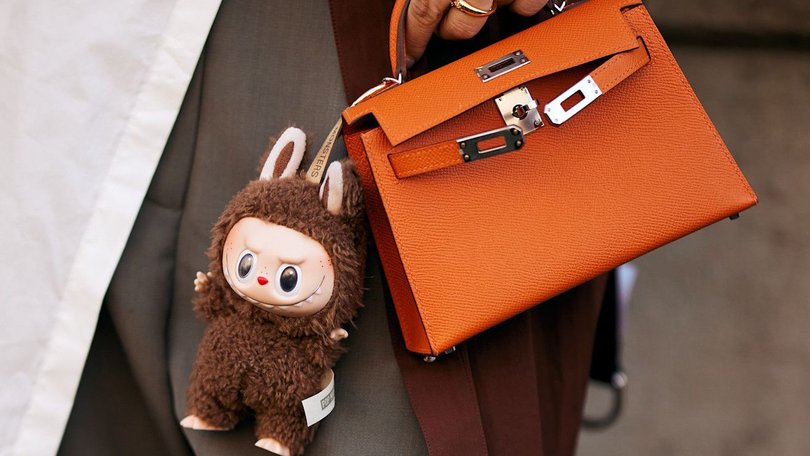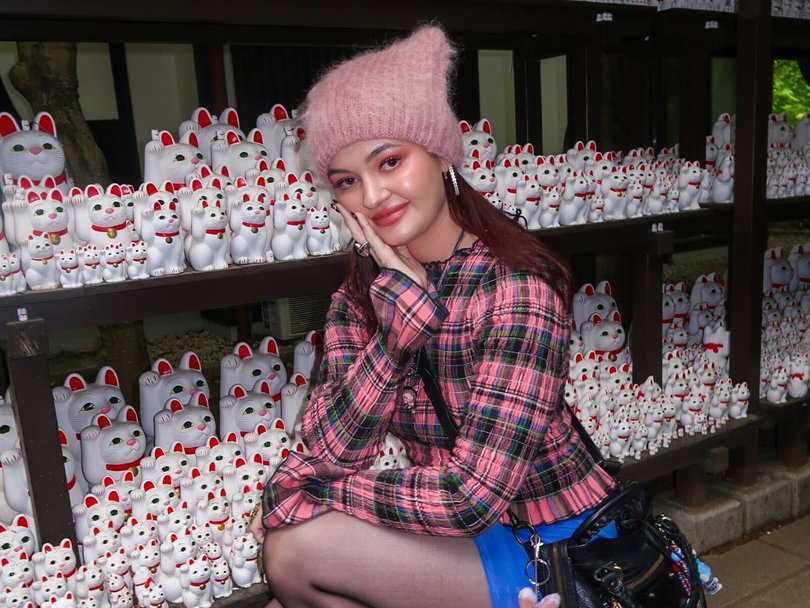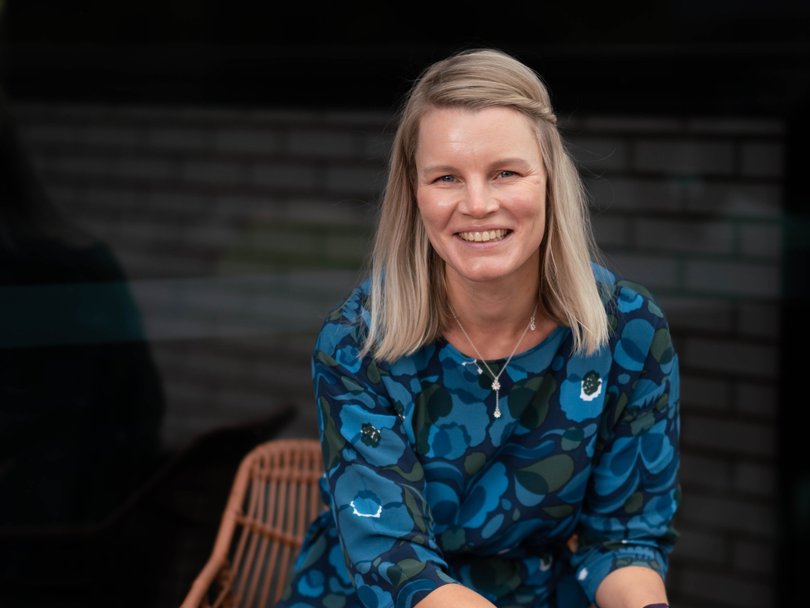Labubu: Harmless treat or sinister addiction? Expert sounds alarm on buying into ‘gambling’ blind box craze
They are fluffy, creepy and loved by adults, kids and celebrities. But what is the blind box buying obsession really doing to those who go to extreme lengths to obtain a ‘rare’ monster?

When Sam Todd laid eyes on a cute-yet-creepy creature dangling – like an oversized keyring – from the luxury handbag of an Asian influencer she follows on TikTok, the Queensland content creator made it her life’s mission to get one.
But the Brisbane-based social media star never imagined her intense lust for a Lychee Berry Labubu would see her scouring Pop Mart stores around the world and lining up for hours in the dark for a mere chance to own it.
“I just saw her and thought, ‘oh my god, what a cute, quirky sort of bag charm’. I just really liked the look of it. It was that simple,” she said.
Sign up to The Nightly's newsletters.
Get the first look at the digital newspaper, curated daily stories and breaking headlines delivered to your inbox.
By continuing you agree to our Terms and Privacy Policy.“I really, really wanted to get the pink one.
“Then trying to get it became so hard and the harder it was to find it, the more I wanted it, so it became like this cycle.”
For the uninitiated, Labubus are collectible plush toy monster elves created by Hong Kong-born designer Kasing Lung and sold by Chinese toy company Pop Mart, which now has 11 stores in Australia.
They have quickly become the must-have fashion accessory for 2025, with celebrities including Rihanna, Dua Lipa and David Beckham authentically endorsing them.
They’ve featured in The New York Times best-dressed list this year, on the runway for brands like Coach in New York and Bottega Veneta in Milan, on the bags of the style-conscious set at Copenhagen Fashion Week and, closer to home, at Australian Fashion Week.
The furry critters are sold in blind boxes, which means customers do not know which one they are getting until they rip open the packaging.
Heightening the excitement is a one-in-72 chance of scoring a “secret”, rare Labubu.
And the popularity of the viral sensation has translated to a big win for Pop Mart’s bottom line — shares in the company have reportedly soared more than 500 per cent in the last year.
Now, experts are warning that the marketing strategy behind the Labubu’s extraordinary success mimics the tactics casinos use to entice and exploit problem gamblers.

Ms Todd, who considers herself an “OG Labubu superfan”, says buying Labubu feels like “low-stakes gambling”.
“It’s addictive either way, because if you get the one that you want, you’re like, ‘oh my god, I have such good luck, so I should get more’,” she said.
“And if you don’t get the one that you want, then you’re like, ‘oh my god, I have to try and get the one that I want’.
“So it’s win-win either way for the brand, but I don’t know about the consumer.”
The 30-year-old admits she is “a marketer’s dream” and became a full-blown Labubu fiend in a matter of months.
“I got into Labubu last year before the craze really hit,” she said.
“At the start it was impossible to get them in Australia.
“I’m not proud but after going to every single Pop Mart in Singapore, I did end up going to a reseller and paying $50 per Labubu.”
She bought four of the elf-like vinyl and plush figures that day in an attempt to hedge her bets to acquire one in a colour she would like.
The millennial, who has about 260K TikTok followers, then dramatically unboxed her “little treats” on social media so her followers could share in her excitement.
In one video, her glittery manicured nails tap on the side of a pretty box before she rips off the cardboard strip, tears the loud crinkly plastic pouch and gasps with joy as she pulls out a plush character.
“Getting the Exciting Macaron collection was like the gateway, because then it opened up to the special edition of Labubu, country-exclusive Labubu and the big Zimomo which is like the boy version of Labubu. There’s just so many elements to it,” she said.
“And because I do a lot of content around travelling and shopping while travelling, naturally, I was like, ‘I need to be getting the country exclusive Labubus’. So that really became a big thing.”
Ms Todd’s Labubu content goes gangbusters, outperforming – by far – any other category of videos she creates.
Consumer psychologist Christina Anthony from the University of Sydney said it was because Labubus were more than mere ‘toys’ for many collectors.
“A lot of consumers are using the Labubus, not only as a social currency, but also as a social connection with others,” she said.
“Anytime you go on TikTok or social media, all you see is unboxing videos. Everyone’s sharing it and everyone’s becoming immersed in that sharing experience.
“But some would say it is not just a toy. It’s gambling disguised as a treat.”
Dr Anthony, a marketing lecturer at Sydney University’s Business School, said buying Labubus in blind boxes taps into the same psychological triggers as gambling.
“It’s the ‘little treat’ economy. It’s affordable. It’s cheap. It gives you that quick dopamine hit that you (crave) when you’re feeling a little bit low,” she said.
“But it has these similarities to gambling processes and a lot of what casinos use to keep consumers coming back and gambling more.
“It does function a lot, psychologically, like a gambling habit.”
The quest to complete your entire Labubu collection can also drive addiction.

“We’re interested in building collections and that’s where it kind of gets into the gambling links, because a lot of these blind box toys use the same psychological tricks that slot machines do, and a lot of it is based on these random rewards,” Dr Anthony said.
“Every time you’re opening this little box and you don’t know what’s in there, there’s that anticipation and it feels a little bit like a gamble.
“It’s a lottery, because you don’t know what the outcome is going to be.”
Dr Anthony said blind boxes also create repetitive buying behaviour.
“It’s not just about the individual toy. You’re trying to complete a set of these toys, and you’re pushing to have the whole collection,” she said.
“Our brains don’t like open loops so when you buy one of the collectibles, you’re then like, ‘I need to get the next one to complete the entire set’.
“As humans, we like completion and closure and that’s what we’re trying to achieve.”
Dr Anthony said the hunt for Labubus, with their devilish grins, can become all-consuming.
“That’s the addiction part of it,” she said.
“It’s always on your mind, because there’s so many stages in this consumption process.
“There’s the anticipation before purchase, there’s the actual purchase, there’s the showing of the purchase, and then it’s a loop that starts all over again because you need to move on to the next one.”
But that next fix can be hard to find as new stock regularly sells out within seconds, creating surprise, scarcity and deep disappointment for those who miss out.
Labubus range in price and size but retail from about $32 in Australia. However, the coveted toys are often resold online for hundreds, or even thousands, of dollars.
Recently, a human-sized Labubu figure sold in Beijing for an eye-watering $231,535.

Director of the Australian National University Centre for Gambling Research, Associate Professor Aino Suomi, said the mystery box strategy to sell products was not new – think cereal box prizes, Kinder Surprises and Pokémon cards – but this tactic, along with manufactured scarcity, is “ethically problematic”.
“The definition of gambling is that you’re using money – fake money or real money – for something of value, and you don’t know the outcome of that purchase before you put the money in and that’s exactly what these mystery boxes are,” she said.
“It’s just the anticipation of the outcome that gives you the dopamine hit that goes into exactly the same reward pathways as other addictions.
“What’s really concerning is that these are targeted at children and obviously not regulated like gambling.”
Dr Suomi said that like gambling, Labubu boxes present “a random chance outcome”.
“I’ve seen them pop up on my social media and it’s really similar to these other gambling-like features marketed to children,” she said.
“So there’s these unboxing parties and it’s the rarity of the secret Labubus.
“The rarer (Labubu), the bigger dopamine hit you get, or even just the anticipation of it so it’s absolutely (tapping into the same) gambling impulses.
“It’s definitely doing exactly the same thing in the brain.”
Dr Suomi, a public health researcher and psychologist, said Labubu blind boxes were like loot boxes in video games.
“What’s quite problematic in these kinds of blind boxes, whether they’re online or whether they’re physical boxes, is that there’s the gambling element when you engage with it,” she said.
“We know that engaging in these types of activities, with gambling-like features, is related to experiencing gambling harm in the future.”
The expert, whose work focuses on child and family wellbeing in the context of gambling harm, said she would like to see blind box toys regulated to prevent children from purchasing them, given how addictive they are.
“I would like to see that, but where do you draw the line because there’s so many things like this,” she said.
“I think there should be at least some kind of warning system that this is a random chance feature and parents should be taking note of that.
“Children are vulnerable because their brains are not fully developed.”
Ms Todd, who has collected about 20 of the plush toys, said that while she loves her Labubus, the quest for new ones no longer consumes her.
“I think a lot of people can be really negative about Labubus now that they’ve reached this sort of new height of popularity but it’s just fun,” she said.
“It’s really fun, but it’s not my whole life.
“It’s whimsical. It’s a reclaiming of the inner child. It’s collecting. It’s just not that deep.”

